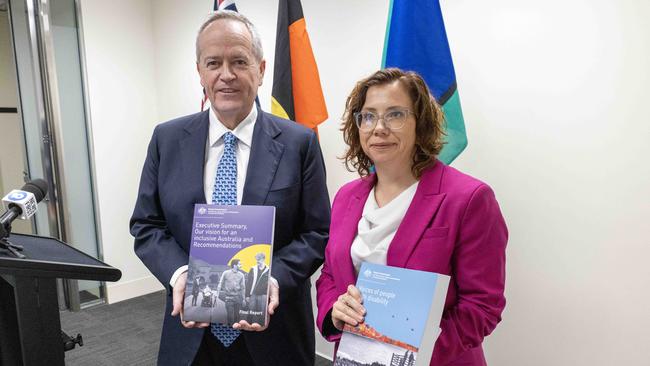Disability royal commission: Dithering fuels discord and an uncertain future for many of our most vulnerable


The $600m royal commission into the mistreatment of Australians with disabilities has failed to deliver a unified blueprint, created uncertainty and laid the ground for more dithering by governments and bureaucracies.
Unlike the aged care royal commission, which set out clear timelines and details for funding arrangements and programs, the disability royal commission’s 222 recommendations lack decisive actions to fast-track reforms.
Since Scott Morrison announced the royal commission in April 2019, there have been 34 public inquiries, seven commissioners, 837 witnesses, 7944 submissions, seven progress updates and an interim report.
The damning findings and witness evidence collected over 4½ years shine a light on structural failings that have disadvantaged Australians with disabilities over decades.
The Albanese government, which on Friday announced a new taskforce would provide an update on its response by early next year, has been handed a report in which the commissioners themselves couldn’t agree on how best to integrate children with disabilities in schools and phase out group homes.
Disability advocates, who have lost trust in the system, expressed disappointment in the royal commission’s lack of ambition in ending segregation in schools and the government’s initial response. The core issues around exploitation, violence, neglect and abuse of people with disabilities are long established.
Highlighting divisions in the royal commission was a proposal to shutdown special schools and special units, which was backed by three commissioners and opposed by three.
Under a 28-year “milestones” proposal, supported by commissioners Barbara Bennett, Rhonda Galbally and Alastair McEwin, no special schools or units would be built from 2025. From 2032, there would be no new special school enrolments of children with disabilities, and new places would end in 2041. By 2051, no students would remain in special and segregated schools.
Royal commission chair Ronald Sackville and commissioners Andrea Mason and John Ryan did “not share the view that it is necessary or appropriate to phase out non-mainstream schools to support inclusive education”. They acknowledged their plan to boost inclusion in mainstream schools would “face many obstacles and require a substantial investment of public funds”.
While all commissioners agreed major improvements to group homes were needed, they split on the future role of group homes. Four commissioners endorsed the phasing out of group homes within 15 years, another supported a phase-out within a generational time frame and Mr Sackville endorsed “choice” around more flexible accommodation options.
Other recommendations included a new Disability Rights Act, amendments to the Disability Discrimination Act, a minister for disability inclusion and a disability, equality and inclusion department.
Decision-makers seeking to protect disabled Australians from abuse, exploitation and neglect must avoid new bureaucracies and complex laws for the sake of it.
Well-intentioned actions lacking proper planning and sustainable funding models will fail to deliver long-term workforce, education and residential living outcomes.
The Australian Human Rights Commission proactively suggested the proposal for an independent National Disability Commission statutory authority could be immediately realised by providing the Disability Discrimination Commissioner with a “broader mandate and additional resources”.
After blaming the Coalition for almost a decade for not doing enough for 4.4 million disabled Australians, it is now Labor’s job to drag the states and territories to the table and implement meaningful reforms.
In the modern political era, federal governments choose reviews, taskforces and working groups to avoid hard decisions or force the states and territories to stump up on disability services, the NDIS, housing, energy and tax. For too long, premiers and chief ministers have been allowed to shirk responsibilities.
The clock is ticking for the Albanese government, which has spruiked its fiscal discipline, to decide whether it emulates the Coalition’s record budget spend following the aged care royal commission.


